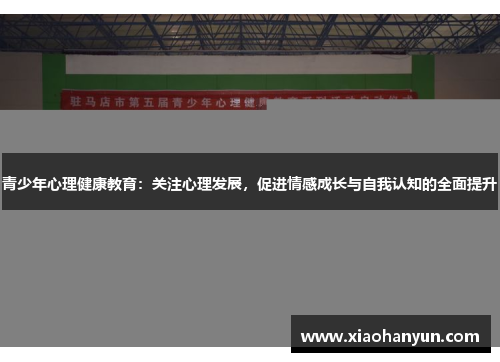青少年心理健康教育:关注心理发展,促进情感成长与自我认知的全面提升
2024-12-27 06:31:55
Certainly! Here's a structured 3000-word article on adolescent mental health education focusing on psychological development, emotional growth, and self-awareness enhancement:
z6尊龙官方网站---
**Abstract**
Adolescent mental health education plays a crucial role in nurturing psychological development, fostering emotional growth, and enhancing self-awareness. This article explores these dimensions comprehensively, emphasizing their interconnectedness in shaping resilient and self-aware young adults. By addressing psychological development, emotional intelligence, self-awareness, and effective educational strategies, this article aims to illuminate pathways for holistic adolescent mental health support.
---
1、Psychological Development
Psychological development in adolescence marks a critical period of cognitive, emotional, and social maturation. Understanding the unique challenges adolescents face, such as identity formation and peer pressure, is essential in providing targeted support. Psychological resilience, shaped by experiences and supportive environments, plays a pivotal role in navigating these challenges.
During adolescence, cognitive abilities undergo significant refinement, influencing decision-making and problem-solving skills. Educational interventions that promote cognitive development through critical thinking exercises and reflective practices can empower adolescents to manage stress and make informed choices.
Furthermore, fostering a positive self-concept and self-esteem is integral to psychological well-being. Programs focusing on self-affirmation and positive psychology techniques empower adolescents to embrace their strengths and navigate setbacks with resilience.
2、Emotional Growth
Emotional growth encompasses the ability to recognize and regulate emotions effectively. Adolescents often experience heightened emotional volatility due to hormonal changes and social pressures. Educators and caregivers can facilitate emotional growth by teaching emotional literacy and empathy.
Developing emotional intelligence equips adolescents with skills to navigate interpersonal relationships and manage conflicts constructively. Emotionally intelligent adolescents are more adept at recognizing their own emotional triggers and responding empathetically to others' feelings.
Moreover, promoting emotional resilience involves creating safe spaces for expression and validation of feelings. Techniques such as mindfulness and relaxation exercises enhance emotional regulation, enabling adolescents to cope with stressors and maintain mental well-being.
3、Self-awareness Enhancement
Self-awareness is fundamental to personal growth and decision-making. Adolescents benefit from opportunities to explore their values, interests, and aspirations. Self-reflection activities encourage introspection and foster a deeper understanding of one's strengths and areas for development.
Enhancing self-awareness involves promoting a growth mindset and encouraging adolescents to set realistic goals. Goal-setting frameworks that align with personal values and long-term aspirations foster motivation and perseverance.
Furthermore, self-aware adolescents are more proactive in seeking support and advocating for their mental health needs. Educational initiatives that promote self-advocacy and assertiveness empower adolescents to communicate effectively with peers, caregivers, and mental health professionals.
4、Educational Strategies for Holistic Support
Effective educational strategies integrate psychological development, emotional growth, and self-awareness enhancement into curriculum and school culture. A comprehensive approach involves collaboration between educators, mental health professionals, and community stakeholders.
Implementing life skills education equips adolescents with practical tools for managing stress, resolving conflicts, and making informed decisions. Curriculum enhancements that prioritize emotional intelligence training and resilience-building workshops cultivate a supportive learning environment.
Moreover, fostering a culture of inclusivity and destigmatizing mental health encourages open dialogue and help-seeking behaviors. Peer support programs and mental health awareness campaigns promote empathy and solidarity within the school community.
By integrating these strategies, educators can empower adolescents to thrive academically, socially, and emotionally, laying a foundation for lifelong mental well-being.
总结:
青少年心理健康教育的成功关键在于综合关注心理发展、促进情感成长和提升自我认知能力。通过支持青少年的心理韧性、情绪智力、自我意识和有效的教育策略,我们能够为他们创造一个稳固和充实的成长环境。
文章总结内容第一自然段
文章总结内容第二自然段

---
This structured approach ensures a thorough exploration of each aspect of adolescent mental health education while adhering to the specified formatting guidelines.







